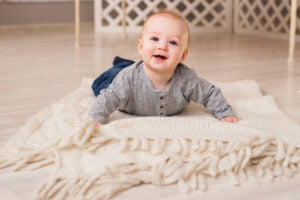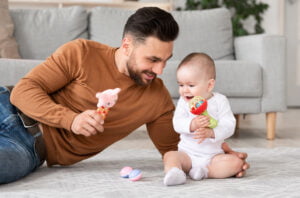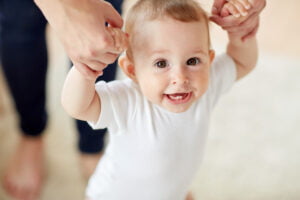Reasons For Late Walking in Babies

One thing I’ve learnt as a mum, carer and paediatrician is that no two children are the same! Every one develops in their own unique way. This is especially true of how you little one chooses to get themselves from A to B.
Babies and toddlers often find some pretty interesting ways to get around. Common methods are rolling, commando crawling and bum shuffling. One of my boys was particular good at sliding along with one leg tucked under his bum. He really mastered the technique and could get around pretty damn fast! Even now at nearly 3 years old he will still revert to this mode of transport when he’s really in a rush!
All this variation can make it can be hard as a parent or caregiver to know when to worry. When do babies pull themselves up to sit? When do they crawl? When do they start to run?
So here are some key milestones in your little one’s development of movement to watch out for and what to do if you are worried.Sitting Without Support

When do babies pull themselves up to sit? Most babies should be able to sit without being held or supported by 9 months old. They build this skill by gradually strengthening the core muscles in their back, stomach and neck. In general they will work out their own exercise regime to achieve this, but there are a few activities you can try to help support them.
Activities to Build Sitting Strength
Tummy Time

Tummy time is a great way to build core strength that you can start from soon after birth. Place them on their tummy on a play mat or blanket. From around 3 months most babies will naturally start to raise their head and shoulders off the ground, roll, twist and kick in this position. A great tip is to place a toy or snack slightly out of reach to encourage them to try new moves!
Supported Sitting

Helping your little one sit with the support of your hands or pillows is a great way to help them see things from an upright perspective and start to really build that sitting strength. Remember always stay with your little one and place them somewhere they can’t tumble from!
Offer activities like tummy time and supported sitting regularly throughout the day and for short periods of 15-20 minutes to start. Remember for them it’s the equivalent to a good gym session as they start to grow their tiny muscles.
If you are concerned your baby is 9 months or older and is not yet sitting you should talk to your doctor.
Standing with Support

Amazingly babies have a reflex to take steps when held upright even from birth. From around 4 months they will have started to stand and bounce when held. These reflexes helps them strengthen their core, pelvis and legs muscles. Nothing made my little girl happier than bouncing for literally hours until everyone’s arms were exhausted!
By 9 months most babies will begin to spontaneously start to pull themselves up using furniture or a walker, and most will stand and move around with the support of objects or a hand by 12 months.
The most common reasons for babies choosing not to stand is having a better way to get around! It’s really common for babies that shuffle on the floor as my son did to be slower in standing and walking. Some little ones also don't initially like the feel of different textures and temperatures on their feet as they try to walk. Non-slip socks and soft ‘pre-walker’ shoes can be helpful if this is the case for your little one.
If your baby is 12 months or older and is not starting to stand with support you should speak to your doctor for advice.
Activities to build standing strength
Walkers and Bouncers
The urge to start standing and cruising around furniture happens pretty spontaneously for most babies, they really don’t need much encouragement once they get going!
That said there are lots of products like walkers and bouncers on the market that can be handy to help entertain little ones who are eager to get moving. Experts generally advise against sit-in walkers and bouncers for long periods of time. A recent study published by the American Academy of Pediatrics found that mobile walkers are the the cause of over 2000 injuries in children each year in the US alone.

Using walkers and bouncers can also lead to imbalances in muscle development as they tend to cause the legs and feet to be held out straight for long periods of time. So if your babies loves their walker or bouncer be sure to never leave them unattended and limit use to periods of 15-20 minutes at a time just like other exercise.
Walking Independently

The age at which little ones take their first independent steps is really variable, but most will reach this magical milestone by 18 months. It’s best to let them go at the own pace and not worry too much. Many take a few steps and then think better off it! That’s totally normal and nothing to worry about.
If your baby is over 18 months and has not begun to attempt to walk you should speak to your doctor for advice.
When and how to choose your baby's first shoes
Once your baby is regularly taking independent steps it’s time for the next exciting milestone, their first pair of shoes!
There’s lots of information out there, here are a few helpful resources.
We hope you found this article useful. Did you know that the Poppet community is a great place to find more helpful tips and resources for your family as well as flexible childcare from local parents and approved providers, all at the touch of a button. Register here today!
And here’s a list of other great resources to keep your family healthy and well
https://www.healthychildren.org/
https://www.nidirect.gov.uk/conditions/childhood-illnesses
https://www.sja.org.uk/get-advice/first-aid-advice/paediatric-first-aid/
https://firstaidchampions.redcross.org.uk/primary/first-aid-skills/
https://www.healthhub.sg/programmes/183/parent-hub
https://www.savethechildren.org/
Disclaimer: This article is for education purposes and does not constitute medical advice. You should seek advice from a trained medical professional if you have concerns about your child’s health.

